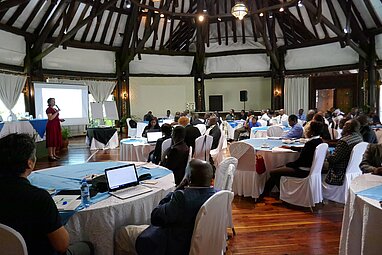Strengthening sustainability efforts: helping to address living income for coffee farmers in the mid

The global coffee crisis is causing immense hardship to farmers as they struggle to put measures in place to deal with market volatility. The Global Coffee Platform recently called for urgent global collective action to overcome this crisis, which is threatening the lives of millions of smallholder coffee farmers, the environment and the coffee industry itself.
In Kenya, the coffee industry is faced with difficult questions about its future as production drops and the country struggles to meet demand. Close to 70 per cent of Kenyan coffee is produced by small-scale farmers. The coffee industry is made up of a cooperative system of production, processing, milling, marketing and auction systems. The multitude of players along the supply chain make addressing the issue of livelihood a more complex one.
The increasing urgency for collective action
Whilst the challenges surrounding income of coffee farmers are commonly discussed in this sector, there is no collective action as of yet. In May a workshop was organised by experts from across Kenya’s coffee sector. It focused on the key challenges faced by the smallholder coffee farming sector and explored how the conversation on improving livelihoods for smallholder farmers can be taken forward.
Using research to inform improvements
During the workshop a wealth of living income research was explored and discussed. Participants heard how, based on a living income benchmark study for farmers in Kenya, 77 per cent of farmers’ income fell significantly below the benchmark. So, can sustainability standards support in improving income levels? Based on findings from another study in the same region of Bungoma, Kenya, cooperatives applying two certification systems (Fairtrade and UTZ) showed that although income impacts were not see at the early stages, training provided was definitely seen as a key catalyst for impact improvement. The results of the study resonated well with the participants who citied similarities in other regions.
Certification is a journey towards improvement; addressing complex sustainability issues across a variety of contexts takes time and is a long-term effort. Participants agreed that they should aim to align resources to avoid replicating efforts. A range of key interventions were also highlighted, including:
-
implementing government intervention strategies to support farmers on production cost reduction and increasing yields
-
identifying alternative sources of farmer income
-
Improving accessibility to information and record-keeping
-
encouraging partnerships to improve access to information and building farmer networks.